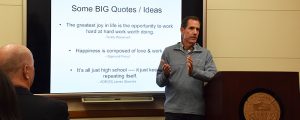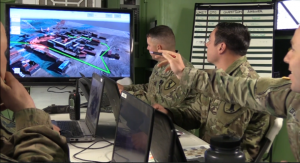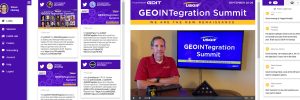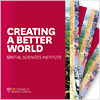On Tuesday, October 13, 2020, COL [R] Steven D. Fleming, Ph.D., represented the University of Southern California on a leadership panel on the first day of DGI Virtual 2020, the world’s leading geospatial intelligence conference. Instead of convening in London, this year’s DGI was conducted virtually, with participants streaming in from across multiple continents and time zones.
 Fleming, professor of the practice with the Spatial Sciences Institute and the USC Institute for Creative Technologies, joined the other leadership session speakers in addressing how GEOINT education, training and tradecraft are adapting to new geospatial intelligence requirements post COVID-19.
Fleming, professor of the practice with the Spatial Sciences Institute and the USC Institute for Creative Technologies, joined the other leadership session speakers in addressing how GEOINT education, training and tradecraft are adapting to new geospatial intelligence requirements post COVID-19.
The moderator, Lt Colonel [R] Michael Thomas, professor of cyberwarfare studies, US Air War College, first asked the panel to differentiate between education, training and tradecraft.
Fleming concurred with Dr. Todd S. Bacastow, professor of practice for geospatial intelligence, College of Earth and Mineral Sciences, Pennsylvania State University, that education is the acquisition of knowledge, whereas training is the application of education to the development of practical skills. They discussed how tradecraft is knowing how to apply education and training to in an operational context and in particular workplace situations. Fleming emphasized that developing tradecraft is a very individual process, in that each individual processes their lifetime of knowledge and understanding uniquely and has the opportunity to act upon that knowledge in their own way.
 To that end, Major Paul Hurst, senior instructor, Royal School of Military Survey, Joint Intelligence Training Group, UK Ministry of Defense, observed that the biggest change and challenge over past nine months is in how we deliver the ability for young professionals – civilian as well as military – to develop GEOINT tradecraft.
To that end, Major Paul Hurst, senior instructor, Royal School of Military Survey, Joint Intelligence Training Group, UK Ministry of Defense, observed that the biggest change and challenge over past nine months is in how we deliver the ability for young professionals – civilian as well as military – to develop GEOINT tradecraft.
Regarding the challenges of teaching and learning in remote learning environments, Bacastow reported that students “running out of gas.” The panelists concurred that what we all thought would be coping mechanisms for a short-term situation are now inadequate for dealing with long-term stress.
Fleming also pointed out that residential students, such as undergraduates in R-1 universities such as USC, have different learning expectations and skill sets than students who signed up for a remote learning modality, such as masters students in online GIS programs. A particular challenge, noted Fleming, is in delivering the “high touch” educational, training and tradecraft content, such as instruction in flying a drone.
This spring and summer, we experienced a “perfect storm” of residential students with expectations for the traditional value proposition of in-person education with faculty who weren’t prepared to deliver in an online modality. Bacastow agreed, saying that when discussing “online learning,” it is important to distinguish the remote synchronous modality from the virtual asynchronous modality. Hurst reported the additional challenge of the “digital divide” and the unanticipated expense of providing resources for students who don’t have the necessary resources for themselves.
Fleming quoted Alvin Toffler: “The illiterate of the 21st century will not be those who cannot read and write, but those who cannot learn, unlearn, and relearn.” He stressed that adaptability is the key to the future: while this environment is stressful for both faculty and students, we are learning the skill of adaptability. We are in a field which is a dynamic discipline, so collectively we need to push ourselves.
Bacastow also shared a favorite quote: “In confusion there is opportunity.” He encouraged the audience to be willing to take risks that we might not otherwise have felt the need to take. He suggested that we need more case studies; he recommended that we should be making the investment to build out an effective library of case studies, especially that can be cast in the non-secure environment. Fleming pointed out that case studies in the emergency response area would provide analogs with non-classified information and contexts that would have military applicability.
Hurst indicated that within the UK Ministry of Defense, they are trying to analyze the effectiveness of the engagement over the past several months. Their goal would be to re-design training and tradecraft preparedness purposefully instead of being reactive. Fleming urged that over the next few years, we need to pivot to designing technologies to support the pedagogy, as opposed to configuring the pedagogy to take advantage of existing technologies. Since “this won’t be our last rodeo,” Fleming advised we should prepare for resilience in addressing future challenges. He further noted that this situation has taken its toll on mission readiness – certainly the pandemic implications have diminished the ability to stay prepared with physical readiness and to be prepared to be good teammates. Nevertheless, students should expect that as life-long learners, they will experience remote/online learning at some point, and would be advised to develop the ability to learn as effectively as possible in this modality.
In the panel wrap-up, Thomas as the moderator asked each speaker to give a short summary. Bacastow offered, “teach the teachers.” Hurst recommended, “blend by design.” Fittingly, Fleming concluded the session with “stay positive – lift each other up.”
 Recently the United States Geospatial Intelligence Foundation honored Fleming its 2020 Distinguished Service Award. Learn more about the human security and geospatial intelligence (GEOINT) programs in which Fleming teaches at https://gis.usc.edu/.
Recently the United States Geospatial Intelligence Foundation honored Fleming its 2020 Distinguished Service Award. Learn more about the human security and geospatial intelligence (GEOINT) programs in which Fleming teaches at https://gis.usc.edu/.


![COL [R] Steven Fleming speaks at DGI Virtual 2020](https://spatial.usc.edu/wp-content/uploads/2020/10/DGI-2021-Virtual-panel-770x412.png)


